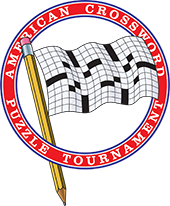Tyler Hinman defends his crossword crown
Source: Polytechnic OnlineDate: March 29, 2006
Byline: Rob Tricchinelli
Tyler Hinman defends his crossword crown
If you're ever solving a crossword and you come across an 11-letter word with the clue "champion," consider penciling in "T-Y-L-E-R-H-I-N-M-A-N." Hinman, a senior information technology major at RPI, won his second consecutive American Crossword Puzzle Tournament this weekend.
The tournament has solvers tackle seven black-and-white grids of varying difficulty over two days, before a final round. While the first four were anywhere from easy to medium-hard, according to Hinman, the fifth was the thorn in the side of the tourney's wordsmiths.
"Five was the mother of the tournament," Hinman said. "Usually five is the most difficult, but this year it was particularly brutal. Of 500 competitors, I think they said 33 finished it correctly."
The New York Times crosswords start out simple on Monday but get progressively harder as the week goes by. Comparing the competition puzzles to the Times, "One and four would be Monday, maybe approaching Tuesday, but nothing beyond that. Two and three, probably Wednesday. Six, Tuesday or Wednesday. And five, usually around Thursday, but this year it approached Friday or Saturday. It was very hard."
After the seven rounds, Hinman found himself tied for second in the A division. Solvers are eligible for prizes in their division and all higher ones. A is open to everyone; B is for contestants who have not won an A or B prize in their last seven tournaments. C, D, and E are all for contestants who have not finished in a certain percentile over the past three years. Hinman won the B division in 2003.
Once the seven rounds are finished, the top three point-scorers in the A-C divisions face off in the ultimate showdown: one division at a time, each solver does the same puzzle on a whiteboard while the entire assembled crowd of entrants watches. The finalists are given soundproof headphones to completely cut out distractions, as well.
Last year, Hinman had the top score entering the final. Things looked bleak when one of his opponents, Al Sanders, breezed through the final puzzle with astonishing speed. Sanders, though, mistakenly called "done" with two blank squares on his grid — a fatal mistake in the final.
"That swung the door wide open for me, and I took the title," said Hinman. But what happened this time around?
"This year, I kicked the door down. I was the only one to finish the last puzzle. It really validated everything. It felt really good to prove that I deserved to be up there and, of the three finalists, I was the only one to crack the sucker in the 15 minutes."
"It was an extremely tough puzzle," Hinman added about the final. "I think they said for the first 30 seconds, nobody had written in one correct letter. I spent at least a minute with a completely blank grid. Finally, I broke through in the lower right and I scratched my way around. I had a lot of trouble in a few places."
After 11:15 of snapping synapses and fast fingers, Hinman filled in "N-A" to complete "S-E-N-A" (to answer the clue "Soprano Jurinac"). The other crossings? The "N" in "genre" and the "A" in "Lao," which was clued as a "Mostly monosyllabic language."
"I had S-E," he said. "But before I filled in the last two ... I decided to leave the two blank and check the rest of the grid to make sure I had them all, then fill them in and immediately say 'done.'"
When he finished, with about 3:45 left on the 15-minute puzzle, he immediately turned back to the audience, looking for any sign of a problem.
"Nobody was groaning," he said with a laugh. "I was really relieved. I ducked off the stage and I just laid down on the ground and watched Ellen and Kiran [the other two finalists]. A couple of times I just put my head down. It was a really draining puzzle; as much as solving a puzzle can be."
The other two finalists ran out of time; Hinman was the only one to complete the final puzzle. There was one answer, in fact — with the clue "That's enough!" — that each of the finalists initially had the same mistake on. They all had "S-T-O-P-I-T," but Hinman eventually figured that it needed to be "D-R-O-P-I-T."
Hinman's daily routine consists of about seven crosswords, in addition to the other puzzles he enjoys — cryptic crosswords, sudoku, and other logic puzzles, to name a few. "I do most of my puzzles on the computer," he said. " I can do them faster than I can on paper. If I printed them all out, I'd be hemorrhaging money on ink and paper."
He doesn't really modify his routine to train for the tournament, either: "Before the tournament, a month or so, I'll pick up a book or two and actually do some puzzles on paper, timing myself. That's the only thing I do differently, in addition to online daily routine."
Perceptive surfers who check out the tournament's website may have noticed Hinman donning a shirt of Trogdor. It became his good luck charm last year, so he kept it up. "I wore it last year," he said. "I knew I was in contention, and I needed one final push to burninate the competition.
"This year, Trogdor strikes again."
When asked how many he could win, though, Hinman was unsure. "There's just no way to tell. There are so many good solvers and so many variables in the puzzles. I really think I can win a couple of more. Maybe get to five or even higher."
"The all-time record is seven," he added. He does have a long way to go, but with two under his belt at age 21, the sky's the limit for this cunning cruciverbalist.

